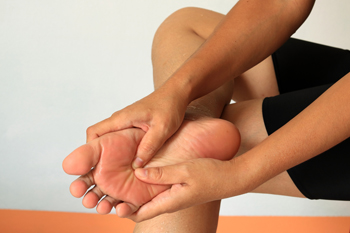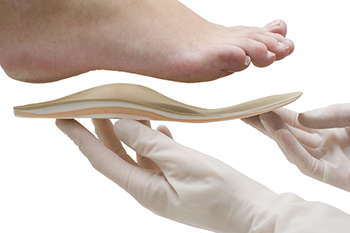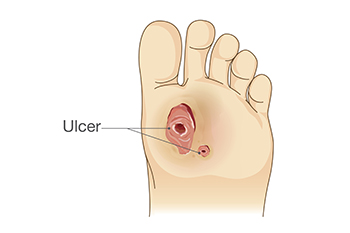
(616) 846-3400
Fax: (616) 846-3406

(616) 846-3400
Fax: (616) 846-3406

Neuropathy is a general term used to describe dysfunction or disease of the nerves. Peripheral neuropathy is nerve dysfunction that occurs in one or more peripheral nerves (nerves that are not part of the brain or spinal cord). Peripheral neuropathy can be caused by diabetes, genetic disorders, infections, autoimmune diseases, alcoholism, toxins, medications, and tumors, or there may be no known cause. Symptoms of peripheral neuropathy include pain, sensitivity to touch, numbness, tingling, or decreased feeling in the feet, which may make it difficult or impossible to detect developing wounds. If you are experiencing any of these symptoms, make an appointment with a podiatrist. They will examine you and conduct various imaging tests to determine the cause and severity of your condition and the most effective treatment options available to you.
Neuropathy
Neuropathy can be a potentially serious condition, especially if it is left undiagnosed. If you have any concerns that you may be experiencing nerve loss in your feet, consult with Dr. Robbi Young from Grand Haven Foot & Ankle. Our doctor will assess your condition and provide you with quality foot and ankle treatment for neuropathy.
What Is Neuropathy?
Neuropathy is a condition that leads to damage to the nerves in the body. Peripheral neuropathy, or neuropathy that affects your peripheral nervous system, usually occurs in the feet. Neuropathy can be triggered by a number of different causes. Such causes include diabetes, infections, cancers, disorders, and toxic substances.
Symptoms of Neuropathy Include:
Those with diabetes are at serious risk due to being unable to feel an ulcer on their feet. Diabetics usually also suffer from poor blood circulation. This can lead to the wound not healing, infections occurring, and the limb may have to be amputated.
Treatment
To treat neuropathy in the foot, podiatrists will first diagnose the cause of the neuropathy. Figuring out the underlying cause of the neuropathy will allow the podiatrist to prescribe the best treatment, whether it be caused by diabetes, toxic substance exposure, infection, etc. If the nerve has not died, then it’s possible that sensation may be able to return to the foot.
Pain medication may be issued for pain. Electrical nerve stimulation can be used to stimulate nerves. If the neuropathy is caused from pressure on the nerves, then surgery may be necessary.
If you have any questions, please feel free to contact our office located in Grand Haven, MI . We offer the newest diagnostic and treatment technologies for all your foot care needs.

Custom orthotics can often provide much needed relief from foot pain and inflammation caused by osteoarthritis or rheumatoid arthritis. Custom orthotics can help distribute the body’s weight more evenly across the feet and reduce pressure and stress placed on joints that are swollen and otherwise compromised by these arthritic conditions. Custom orthotics can also help correct certain alignment and gait issues through improved biomechanics. Oftentimes, custom orthotics can help a person with arthritis reduce the amount of pain medication they take. Some even believe custom orthotics may contribute to a slowing down of the progression of arthritis in certain cases. If you suffer from arthritis in the joints of your feet or ankles, speak with a podiatrist about custom orthotics. If your podiatrist believes custom orthotics can help you (after examining you and diagnosing your condition), they will prescribe a set based on your foot structure and specific needs. They will then create a custom imprint of your feet either digitally or with a plaster cast, and your custom orthotics will be created to offer you the relief you seek.
If you are having discomfort in your feet and would like to try orthotics, contact Dr. Robbi Young from Grand Haven Foot & Ankle. Our doctor can provide the care you need to keep you pain-free and on your feet.
What Are Orthotics?
Orthotics are inserts you can place into your shoes to help with a variety of foot problems such as flat feet or foot pain. Orthotics provide relief and comfort for minor foot and heel pain but can’t correct serious biomechanical problems in your feet.
Over-the-Counter Inserts
Orthotics come in a wide variety of over-the-counter inserts that are used to treat foot pain, heel pain, and minor problems. For example, arch supports can be inserted into your shoes to help correct overarched or flat feet, while gel insoles are often used because they provide comfort and relief from foot and heel pain by alleviating pressure.
Prescription Orthotics
If over-the-counter inserts don’t work for you or if you have a more severe foot concern, it is possible to have your podiatrist prescribe custom orthotics. These high-quality inserts are designed to treat problems such as abnormal motion, plantar fasciitis, and severe forms of heel pain. They can even be used to help patients suffering from diabetes by treating foot ulcers and painful calluses and are usually molded to your feet individually, which allows them to provide full support and comfort.
If you are experiencing minor to severe foot or heel pain, it’s recommended to speak with your podiatrist about the possibilities of using orthotics. A podiatrist can determine which type of orthotic is right for you and allow you to take the first steps towards being pain-free.
If you have any questions please contact our office located in Grand Haven, MI . We offer the newest diagnostic and treatment technologies for all your foot and ankle needs.

Pain in the big toe can be the result of a foot injury, an existing physical condition, or it may indicate there are underlying medical issues. This type of toe pain can accompany arthritis, gout, and specific types of fractures. Pain from arthritis can consist of difficulty in moving the big toe, and there may be swelling near the joint in the big toe. Relief may come from changing the shoes that are worn, and in severe cases, surgery may be a necessary option. People who develop ingrown toenails often have pain in their big toe. It happens when the nail grows into the skin, instead of over it. This ailment can cause extreme pain and discomfort, and surgery is often necessary for permanent relief. The foot condition that is referred to as gout typically affects the big toe. It happens as a result of a buildup of uric acid in the blood, and can form crystals that lodge in the joints of the big toe. The pain can be debilitating, and in severe cases, many patients are unable to walk or stand. Toe pain can be difficult to live with, and if you have this type of pain, it is strongly suggested that you are under the care of a podiatrist who can help you to manage this condition.
Toe pain can disrupt your daily activities. If you have any concerns, contact Dr. Robbi Young of Grand Haven Foot & Ankle. Our doctor can provide the care you need to keep you pain-free and on your feet.
What Causes Toe Pain?
Most severe toe pain is caused due to a sports injury, trauma from dropping something heavy on the toe, or bumping into something rigid. Other problems can develop over time for various reasons.
Toe pain can be caused by one or more ailments. The most common include:
When to See a Podiatrist
Diagnosis
In many cases the cause of toe pain is obvious, but in others, a podiatrist may want to use more advanced methods to determine the problem. These can range from simple visual inspections and sensation tests to X-rays and MRI scans. Prior medical history, family medical history, and any recent physical traumatic events will all be taken into consideration for a proper diagnosis.
Treatment
Treatments for toe pain and injuries vary and may include shoe inserts, padding, taping, medicines, injections, and in some cases, surgery. If you believe that you have broken a toe, please see a podiatrist as soon as possible.
If you have any questions please feel free to contact our office located in Grand Haven, MI . We offer the newest diagnostic tools and technology to treat your foot and ankle needs.

Diabetic patients commonly suffer from nerve damage known as diabetic neuropathy and circulatory problems in their feet. Nerve damage can cause tingling, numbness, and sensitivity, and also prevent the diabetic from feeling pain or detecting when they have a cut, crack, or another small abrasion on their feet. Any disturbance in the skin such as this would normally be able to heal, were it not for the inadequate flow of blood in the diabetic patient. So even the smallest undetected skin injury can worsen quickly and develop into a wound because it is not getting the supply of oxygen and nutrients it needs to heal. That is why it is vitally important for diabetics to inspect their feet daily and to see a podiatrist right away if anything unusual is spotted. Regular examinations with a podiatrist would be advantageous to the diabetic to prevent wounds from developing as well as be proactive about their foot health.
Wound care is an important part in dealing with diabetes. If you have diabetes and a foot wound or would like more information about wound care for diabetics, consult with Dr. Robbi Young from Grand Haven Foot & Ankle. Our doctor will assess your condition and provide you with quality foot and ankle treatment.
What Is Wound Care?
Wound care is the practice of taking proper care of a wound. This can range from the smallest to the largest of wounds. While everyone can benefit from proper wound care, it is much more important for diabetics. Diabetics often suffer from poor blood circulation which causes wounds to heal much slower than they would in a non-diabetic.
What Is the Importance of Wound Care?
While it may not seem apparent with small ulcers on the foot, for diabetics, any size ulcer can become infected. Diabetics often also suffer from neuropathy, or nerve loss. This means they might not even feel when they have an ulcer on their foot. If the wound becomes severely infected, amputation may be necessary. Therefore, it is of the upmost importance to properly care for any and all foot wounds.
How to Care for Wounds
The best way to care for foot wounds is to prevent them. For diabetics, this means daily inspections of the feet for any signs of abnormalities or ulcers. It is also recommended to see a podiatrist several times a year for a foot inspection. If you do have an ulcer, run the wound under water to clear dirt from the wound; then apply antibiotic ointment to the wound and cover with a bandage. Bandages should be changed daily and keeping pressure off the wound is smart. It is advised to see a podiatrist, who can keep an eye on it.
If you have any questions, please feel free to contact our office located in Grand Haven, MI . We offer the newest diagnostic and treatment technologies for all your foot care needs.

A diabetic foot ulcer is an open sore or wound that affects about 15 percent of people with diabetes. There are two main types of foot ulcers, neuropathic and vascular. High blood sugar levels are thought to be the cause of both types. Being overweight, smoking, and frequently drinking alcohol are other contributing factors. People who have diabetes for years often develop neuropathy, a reduced or limited ability to feel pain in the feet. As a result, sores and cuts, especially on the bottom of the feet, may be overlooked. Vascular inefficiency, a slowed blood flow to the extremities, can reduce the ability of foot ulcers to heal properly, which increases the likelihood of infection. Tissue around a skin ulcer can become blackened, and gangrene may develop. Of those who develop a foot ulcer, up to one-fourth will be at risk of amputation. Fortunately, it is possible to prevent the formation of foot ulcers through a rigorous daily foot care regime. If an ulcer has formed, however, debridement (cutting away of dead tissue), certain medication, sterile dressings, and managing glucose are suggested. For more information on prevention and treatment of foot ulcers, please consult a podiatrist.
Diabetic foot care is important in preventing foot ailments such as ulcers. If you are suffering from diabetes or have any other concerns about your feet, contact Dr. Robbi Young from Grand Haven Foot & Ankle. Our doctor can provide the care you need to keep you pain-free and on your feet.
Diabetic Foot Care
Diabetes affects millions of people every year. The condition can damage blood vessels in many parts of the body, especially the feet. Because of this, taking care of your feet is essential if you have diabetes, and having a podiatrist help monitor your foot health is highly recommended.
The Importance of Caring for Your Feet
Patients with diabetes should have their doctor monitor their blood levels, as blood sugar levels play such a huge role in diabetic care. Monitoring these levels on a regular basis is highly advised.
It is always best to inform your healthcare professional of any concerns you may have regarding your feet, especially for diabetic patients. Early treatment and routine foot examinations are keys to maintaining proper health, especially because severe complications can arise if proper treatment is not applied.
If you have any questions please feel free to contact our office located in Grand Haven, MI . We offer the newest diagnostic and treatment technologies for all your foot and ankle needs.